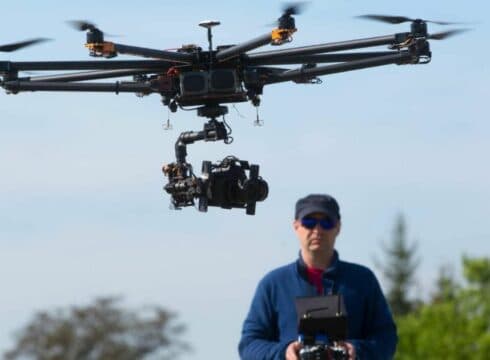The aviation regulator is expected to announce this on October 19
In June, the aviation body had brought out a draft circular that proposes to allow interested organisations to sign up as drone pilot training schools
Those willing to be RPTOs are supposed to take a no-objection certificate from the DGCA
Inc42 Daily Brief
Stay Ahead With Daily News & Analysis on India’s Tech & Startup Economy
In a major push to the drone tech sector in India, the Directorate General of Civil Aviation (DGCA) has permitted central, state government bodies and private drone manufacturers to become drone pilot training schools. Earlier, only a few Flight Training Organisations (FTOs) were eligible to become drone pilot training schools and the focus was primarily on training fixed-wing aircraft pilots.
However, this will bring more scope for those who want to become a drone pilot school. The regulator is expected to announce this on October 19, reported Medianama.
In June, the aviation body had brought out a draft circular that proposes to allow interested organisations under the central and state governments, government-approved universities, and even private drone manufacturers to sign up as drone pilot training schools.
Now, entities selected by the DGCA will be able to train drone pilots and grant commercial pilots licences and private pilot licences.
Prerequisites For Nod
According to DGCA, drone pilot training schools must have at least three serviceable remotely piloted aircraft (RPA) of one type at any given time. Once an institution fulfils these requirements, the DGCA will approve them as an RPTO, initially for a period of five years. Those willing to be RPTOs are supposed to take a no-objection certificate from the DGCA. To apply for a NOC, an applicant will have to submit evidence of having funds of at least INR 10 lakh in the form of paid-up capital, a project report containing details of the proposed set-up including a 3-year business plan, a proposed financial structure, ownership pattern, time frame for operationalisation of the project, drone types to be used and their suitability for flying training, human resource, maintenance support, and other such information.
According to Inc42 Plus Drone Technology: India Opportunity Report 2019, the total funding raised by drone startups in India from 2014 to 2018 was just $16.56 Mn which accounts for a mere 2.26% of the total deeptech funding ($732 Mn) in this period.
In September 2018, the ministry of civil aviation (MoCA) legalised flying commercial drones under the Digital Sky rules. Following which it released the draft note for Drone Regulations 2.0 in 2019, which had proposed regulations for the operation of drones in public spaces, particularly the ones implemented at a commercial scale. However, drones startups in India are weighed down by high costs and compliance burden when it comes to regulations, which has negatively impacted the investor confidence as well, though interest remains high.
As per ‘Make in India for Unmanned Aircraft Systems’ report by EY, Indian government bodies are leading the way for the application of the drones system in India.
According to global market intelligence and advisory firm BIS Research, the Indian drone market is expected to be valued at $885.7 Mn by 2021, while the global opportunity is estimated to touch $21.47 Bn during this period.
{{#name}}{{name}}{{/name}}{{^name}}-{{/name}}
{{#description}}{{description}}...{{/description}}{{^description}}-{{/description}}
Note: We at Inc42 take our ethics very seriously. More information about it can be found here.


